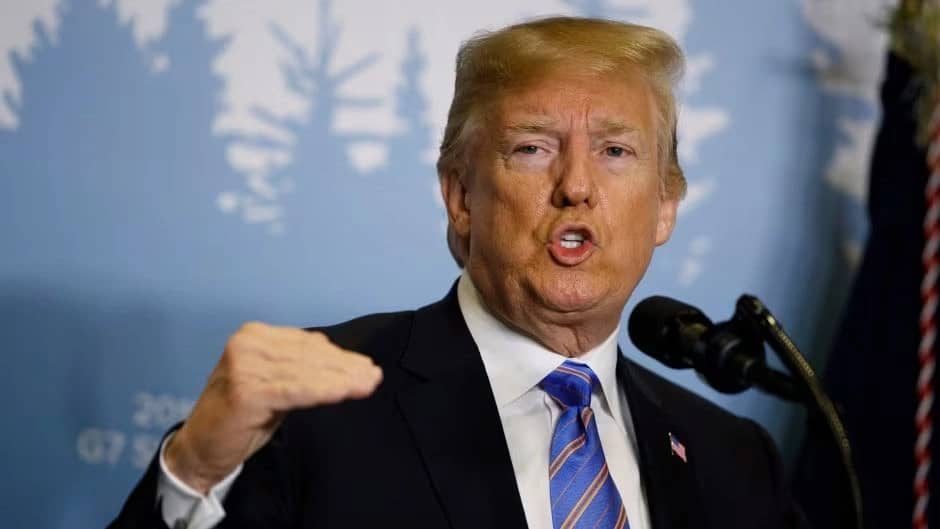In a recent controversial statement, former U.S. President Donald Trump suggested that Canada and Mexico should be absorbed into the United States as new states. His comments, made in a public address, sparked significant debate on social media and among political commentators, as the proposal is both highly unconventional and unprecedented in modern political discourse. Trump’s comments touch on a variety of issues, from trade imbalances to national subsidies, and reflect his longstanding views on the U.S.’s relationship with its neighbors to the north and south.
The Call for Canada and Mexico as U.S. States
During a speech, Trump made the following provocative statement:
“I’ve been thinking for a while, and here’s an idea: Why don’t we make Canada and Mexico part of the United States? We could turn them into states, and it would solve so many problems — from trade to subsidies to defense costs.”
This comment was met with a mixture of incredulity and curiosity, as it raised several significant questions: How serious was Trump? What are the underlying issues he’s addressing? And how would this dramatically alter U.S. relations with its two neighbors?
Trump’s Rationale: Economic and Defense Subsidies
Trump’s proposal was not made in a vacuum but rather within the context of his broader economic and political views, particularly his past criticisms of trade deals and the financial obligations of the U.S. in international defense.
- Trade and Economic Imbalances: Trump has long been critical of trade imbalances between the U.S. and its trading partners, especially during his presidency when he renegotiated several trade agreements. He cited these imbalances as a drain on American resources and jobs.
- Canada and Mexico are two of the U.S.’s largest trading partners, with the United States-Mexico-Canada Agreement (USMCA) replacing the older NAFTA in 2020. Despite the deal, Trump has repeatedly argued that the U.S. is at a disadvantage in these agreements, claiming that Mexico and Canada receive favorable terms that disadvantage American workers.
- If Canada and Mexico were incorporated as U.S. states, Trump suggests, it would “equalize trade” and ensure that the U.S. would be in a stronger economic position, as there would be no need for trade tariffs or cross-border negotiations.
- Subsidization and Economic Burden: Trump has often railed against what he perceives as the U.S. shouldering an unfair burden when it comes to global defense commitments and financial support for neighboring countries.
- Canada and Mexico, while strong allies, are not as financially dependent on the U.S. as Trump perceives European NATO members to be. However, Trump’s frustration with international subsidies is evident in his arguments for U.S. economic self-sufficiency. In this light, absorbing Canada and Mexico could be seen as a way to streamline U.S. fiscal responsibility.
- Additionally, Trump has long criticized the financial costs of military defense for countries that are part of international agreements like NATO. If Canada and Mexico were incorporated as U.S. states, he would likely argue that the U.S. would no longer need to subsidize military defense or foreign aid to these countries.
- National Security and Defense: Trump has always emphasized the importance of national security and often framed defense as a financial burden for the U.S. The idea of bringing Canada and Mexico into the U.S. fold could be seen as a national security strategy, centralizing control over defense matters and border security.
- As U.S. states, Canada and Mexico would be covered under the U.S. defense umbrella, streamlining military presence across North America and potentially eliminating the need for bilateral defense agreements or international peacekeeping missions.
The Reaction: Domestic and International Responses
Trump’s idea has received mixed reactions, ranging from outright mockery to serious consideration by some of his supporters. Here’s how various groups have responded:
- Political Opponents:
- Many critics argue that Trump’s statement is a political stunt and an example of his usual nationalist rhetoric that prioritizes American supremacy and isolationism. Critics also point out the impracticality of such a proposal, which would require a constitutional amendment, extensive political negotiations, and the cooperation of the governments of Canada and Mexico — a nearly impossible task.
- Former Secretary of State Hillary Clinton quickly took to social media, saying, “It’s beyond belief that someone who was once president of the United States would even suggest dismantling two sovereign countries. This is dangerously ignorant.”
- International Reactions:
- Canada: Reaction in Canada has been largely dismissive and incredulous. Canadian Prime Minister Justin Trudeau quickly responded to the proposal, saying that Canada would never consider joining the United States, asserting that Canadian sovereignty and independence are non-negotiable. Political analysts in Canada argue that such a suggestion would face widespread opposition from all political parties.
- Mexico: Similarly, in Mexico, political leaders and citizens have reacted with disdain to Trump’s comments. President Andrés Manuel López Obrador (AMLO) dismissed the idea, stating that Mexico has its own sovereignty and that the suggestion was a fantasy. The idea of becoming a U.S. state would be politically unfeasible in Mexico, where nationalism and pride in independence are deeply ingrained.
- Supporters and Populist Appeal:
- Some of Trump’s more hardline populist supporters have seen this as a bold, nationalistic idea that would reinforce U.S. power and economic dominance. They argue that it would eliminate inefficiencies in trade and defense arrangements and help the U.S. gain more control over its continent.
- Trump’s comments have been framed by some of his backers as a “common-sense solution” to international challenges. They view the proposal as a reflection of his “America First” philosophy, which calls for the U.S. to act in its own best interest without worrying about global obligations or alliances.
Legal and Constitutional Challenges
From a legal perspective, Trump’s proposal faces severe constitutional hurdles. The U.S. Constitution provides a rigorous process for admitting new states, which would likely require the consent of both Congress and the states involved, as well as potentially the cooperation of the existing governments of Canada and Mexico.
- Constitutional Amendments: The U.S. Constitution doesn’t provide a simple mechanism for integrating foreign countries as states. Canada and Mexico would likely need to undergo a process of democratic approval by their citizens, which is highly unlikely given both countries’ political and cultural landscapes.
- Sovereignty Issues: Canada and Mexico are sovereign nations with their own governments, legal systems, and international relations. The idea of merging them into the U.S. would present insurmountable sovereignty issues. Both countries would likely reject the idea outright, considering it a breach of their independence and autonomy.
Historical Context and Comparisons
Trump’s call to incorporate Canada and Mexico is reminiscent of historical periods when the idea of U.S. territorial expansion was discussed. The most notable example is the period of Manifest Destiny in the 19th century when many Americans believed it was their right to expand westward across the continent.
- Annexation of Texas and the Mexican-American War: One could draw comparisons to the annexation of Texas in 1845, which led to the Mexican-American War and the eventual acquisition of large swaths of territory from Mexico (including modern-day California, Arizona, and New Mexico).
- However, today’s world is far different from the 1800s, and the geopolitical, legal, and cultural realities would make such an expansionist idea far more complex and unlikely.
Conclusion: An Unlikely Proposal with Wide-Ranging Implications
While Donald Trump’s proposal for Canada and Mexico to become U.S. states is highly unrealistic, it nonetheless highlights some of the economic and defense issues that have long been central to his political platform. It also underscores his persistent desire to challenge conventional diplomatic frameworks and promote a self-sufficient, America-first policy agenda.
For now, it seems that the suggestion will remain a political talking point rather than a feasible policy proposal. However, it reflects the broader political currents in which nationalism, economic protectionism, and anti-globalism are driving much of the debate in the U.S. and beyond.





